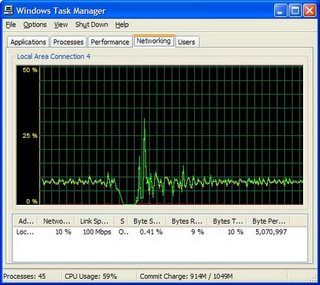Now that my workstation is armed with 3GBs of RAM, I wanted to re-run the load test with greater number of threads allocated. This, of course, requires proportionately greater heap size, so there... I understand 64-bit JVM's stack size is quite large, thus I allowed Glassfish to use up to 2 GBs of RAM for the heap, and I instructed it to create up to 2500 threads in pool, having number of requests to process being same 2500. Fired the server up.
Now, load clients. Fired up the Linux machine upstairs (the one on the wireless connection), connected to it
using PuTTY, directing X traffic through a tunnel to local X server courtesy of
Cygwin X. When I ran JMeter 2.1.1 there last time, configuration was changed there and then, so I was greatly surprised to see "Segmentation fault" as I tried to launch it. Hmm... Increased stack size to 128k: launches fine. And here's the kicker: I exited JMeter, edited its script to _again_ have stack size of 48k and... it worked fine! What is this mystery? Why would Java 1.5 not launch the first time with smaller stack size, but once it had ran with greater stack size, it would have no problem running with the small? Anyway...
And now, JMeter in pain! (Shouted in low voice with reverberation added). So,
Glassfish was running happily for some while, utilizing 1.6GB out of allowed 2GB, consuming remainder of 77% CPU idle while supporting slightly in excess of 2k concurrent connections (judging by both "therads busy" and "connections open"). Linux load client was running 800 threads, Windows load client - 1600. And then I decided to peek at Google Analytics statistics for my blog. Jmeter was not too happy to share the resources:

But as you can see it recovered.
What else... Ah, yeah,
Google Analytics, pertty amazing stuff. It's amusing to know that my other blog entry "
The purpose of life", being completely worthless and uninteresting, was in fact viewed by some person from Tulsa.

